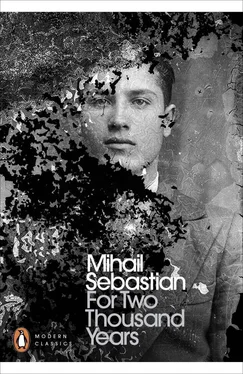And everyone’s happy
Ianchelevici Şapsă is singing. Leaning against the wall, overcoat draped over his shoulders, hands in pockets. He has a heavy, drawling voice that has trouble with the high notes and he stumbles a little at the end of each verse.
‘… A ieider i-id a melah … Every Jew is a king …’
It’s a melody I’ve heard before somewhere, long ago. At home, perhaps, in Grandfather’s time.
My eyes feel hot. It’s nothing, kid. Nobody can see you. And don’t you feel it does you good, infinitely more good, than proudly gritting your teeth and holding it in?
Sing, Ianchelevici Şapsă. You’re a big fellow, twenty-five years old, and haven’t read a book in your life, you’ve passed through life aware of everything around you and steady on your fine animal feet, you wash your own socks and eat a quarter of a loaf of bread and three walnuts for lunch, you talk dirty and laugh to yourself, you’ve never looked at a painting or loved a girl, you swear like a trooper and spit on the ground, but look at you now while we, the rest of us, watch you silently as though by the roadside, you alone Ianchelevici Şapsă, dispirited, sullen and starved though you are — you alone are singing.
*
I’d gone to the rector’s office to ask something. On returning, the vestibule — empty ten minutes before — had been invaded. I didn’t recognize anybody. But it had all the makings of a nasty fight.
So — I’m trapped. I’m noticed by somebody, or so it seems to me. I go up the stairs three steps at a time, slam behind me various doors, hit walls as I veer left and right. On to the second floor, then left, and I don’t feel I can keep going much longer: I stick to the walls and with a trembling hand seek a door. In trepidation, I push a handle. It’s open.
A small, uncomfortable classroom. Ten or twelve in attendance. A very young man is at the lectern: a student or assistant. He’s talking. Probably it’s a seminar.
My head is spinning and I don’t know if I’m afraid of those outside or embarrassed before those inside. I have to do something to occupy myself and compose my nerves. I take out my pencil and pad: I make notes. Mechanically, absently, simply to behave coherently and get a grip on myself. I don’t know what the man at the lectern is saying. I record like a stenographer, like a machine. Involved only in the motion of pencil on paper, indifferent to everything said, completely detached from what’s going on.
And now, this evening, I find this strange piece of paper in my hand:
There is something profoundly artificial in the entire value system underpinning our lives. Not solely in political economy, where the stresses are visible and the evil easy to locate. Financial instability is the most obvious, though not the most acute, crisis of the old world. There are breakdowns that are even more serious, and even sadder agonies. We will understand nothing about the economic crisis we are studying if we get bogged down in technical details. These are secondary. Absolutely secondary. It’s not a financial system that is collapsing today, but a historical system. A structure is being razed, not a handful of forms, facts and details. A crisis of concepts of value in economics and finance is not an isolated fact, as it partakes of a general crisis on all levels of modern life. We live with too many abstractions, too many illusions. We’ve lost the ground beneath our feet. It’s not only the gold standard that has been lost, but any fixed relationship between our symbols and ourselves. There’s a gulf between man and his context. These expressions that you see have become dehumanized. Or, perhaps more accurately, they have become inhuman.
Take any of our institutions, ideas, attitudes, skills or shortcomings, take them one at a time and sound them out. You will notice that they ring hollow. Life has fled from them, the spirit has left them. Why? I don’t know why. The result, perhaps, of the abuse of intelligence. I’m not joking. We have made for ourselves a civilization based on intelligence as the basic value, and this is an expensive luxury and a terrible presumption. Between ourselves and life, we have posed ourselves as arbiters. That is a tragic conceit. We are nothing and it was Descartes who believed otherwise. See now how we pay the price, three hundred years later.
I fear the hour of the fools is upon us. Rather, I don’t fear it at all. I’m glad. Because I have seen what intelligence has done and where it has taken us. Now we turn back, penitent, embittered and with three centuries of weariness, heading back into the forests of foolishness and real life.
You can call that obscurantism. All the better.
*
He’s neither student nor assistant. He’s a professor of political economy. This year he’s teaching a course on ‘the concept of value in the history of economic doctrines’. His name is Ghiţă Blidaru. The boys just call him Ghiţă. He’s come from Munich or Berlin, I’m not sure which. He looks much younger than his thirty-five years. He has a long, drawn, asymmetrical face, with something shy in his smile and commanding, joined eyebrows. He speaks in an offhand drawl, interrupting himself at times with a ‘no?’ like a fiery full stop.
From today’s lecture, a passage that was just a parenthesis:
To be logical? To be logical is not, as is stated in our books, to think according to formulae and equations, but to think according to the essential nature of things. If you really require a definition, try this one: logic is the systemization of intuition.
And laugh.
*
The lecture on Adam Smith:
If you were to ask me what we are doing here, in a class in which the parentheses are longer than the treatment given to the subject of the course, I might respond as follows: we are disposing of values. Clearing them away like dead wood. Intelligence, individualism, free choice, positivism … And we are looking for a single ‘value’, one that contains them all. That is called, if I am not mistaken, life.
*
Mondays and Fridays, from six to seven, Blidaru’s course. We’re a small group of regulars, and we know each other but don’t talk. Sometimes, a new figure appears and takes a seat at the back. I like to look around from time to time and observe, as the lecture progresses, the growing surprise on the face of the new arrival.
*
He spoke today of the superiority of the physiocrats over all the modern schools of economic thinking. Too broad for me to transcribe my course notes here. He spoke stridently, aggressively, with sudden twists in the movement of the argument. (The effect is that of an intelligent agitator working a crowd.) We were waiting, intrigued, for the denouement — when a military march struck up outside our window. A passing company with its colours.
He jumped from the lectern, sprang towards the window, opened it and stood there watching, nodding his head to the rhythm of the big drum.
He then turned to us.
‘Isn’t the street wonderful?’
*
The third lecture on the physiocrats. Blidaru’s course rearranges hierarchies with the greatest of ease. Only a couple of words on what the textbook considers sacrosanct, then ten furious lectures on what the textbook despises most.
There is an element in physiocrat economics which is more powerful than any of their naiveties. Of course, those old men of 1750 had no idea of the mechanism by which goods circulated and what they imagined in this realm is romantic and fantastic as well as false. But for all these errors, there remains one intuition worth incomparably more than any dry statistic. Their economics starts with the earth and returns to the earth. Behold a peasant idea, a simple idea of life, an idea that comes from nature, from the most natural everyday human intuitions. Nothing can demolish such a simple, clear truth.
Читать дальше












